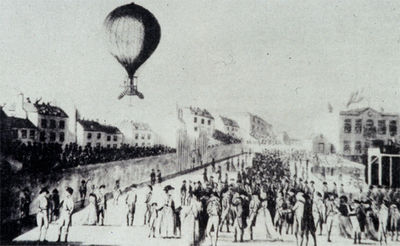Annotation:Air Balloon (1) (The): Difference between revisions
m (Andrew moved page Annotation:Air Balloon (The) to Annotation:Air Balloon (1) (The)) |
No edit summary |
||
| Line 2: | Line 2: | ||
{{TuneAnnotation | {{TuneAnnotation | ||
|f_tune_annotation_title= https://tunearch.org/wiki/Annotation:Air_Balloon > | |f_tune_annotation_title= https://tunearch.org/wiki/Annotation:Air_Balloon > | ||
|f_annotation='''AIR BALLOON, THE.''' English, Country Dance Tune (cut time). A Major. Standard tuning (fiddle). AABB. The melody probably refers to the hot-air balloon ascent of Italian balloonist [[wikipedia:Vincenzo_Lunardi]] (Vincent Lunardi) in September 1784, watched by a crowd of some 150,000, including the Prince of Wales (later George IV). Lunardi's was not the first ascent, for there were balloon flights in France in 1783, and, a month previously, in Edinburgh by James Tytler. Lunardi's was the first in English skies, however, and he caused a sensation when he took off accompanied by a cat, a dog and a pigeon. | |f_annotation='''AIR BALLOON [1], THE.''' English, Country Dance Tune (cut time). A Major. Standard tuning (fiddle). AABB. The melody probably refers to the hot-air balloon ascent of Italian balloonist [[wikipedia:Vincenzo_Lunardi]] (Vincent Lunardi) in September 1784, watched by a crowd of some 150,000, including the Prince of Wales (later George IV). Lunardi's was not the first ascent, for there were balloon flights in France in 1783, and, a month previously, in Edinburgh by James Tytler. Lunardi's was the first in English skies, however, and he caused a sensation when he took off accompanied by a cat, a dog and a pigeon. | ||
[[File:lunardi.jpg| | [[File:lunardi.jpg|400px|thumb|right|Lunardi takes off from the grounds of the Honourable Artillery Company in East London on the 15 September 1784.]] | ||
Lunardi was feted by the city after his feat, and was made an honorary member of the Honourable Artillery Company. King George III granted him a special audience and he was presented with a watch by the Prince of Wales. His balloon became an attraction when exhibited at the Pantheon, a London theater. Unfortunately, Lunardi was unable to translate his fame into lasting success, and he died twelve years later in poverty in a monastery in Portugal. | Lunardi was feted by the city after his feat, and was made an honorary member of the Honourable Artillery Company. King George III granted him a special audience and he was presented with a watch by the Prince of Wales. His balloon became an attraction when exhibited at the Pantheon, a London theater. Unfortunately, Lunardi was unable to translate his fame into lasting success, and he died twelve years later in poverty in a monastery in Portugal. | ||
|f_source_for_notated_version= | |f_source_for_notated_version= | ||
Revision as of 00:25, 21 January 2023
X:1 T:Air Balloon [1], The M:C| L:1/8 R:Country Dance N:"Dances 1785" B:Samuel, Ann & Peter Thompson - Compleat Collection of 200 Favourite Country Dances, vol. 5 (1788, p. 37) Z:AK/Fiddler's Companion K:A A2 Ac E2E2|A2 Ac E4|FGAB cdef|fedc cBAG| A2 Ac E2E2|A2 Ac E4|efef fedc|1cBAG A4:|2cBAG A3:| |:A|fgaf e2A2|fgaf e4|fgaf fedc|cBAG A2 Ee| fgaf e2A2|fgaf e4|fgfa fedc|cBAG A3:|]
AIR BALLOON [1], THE. English, Country Dance Tune (cut time). A Major. Standard tuning (fiddle). AABB. The melody probably refers to the hot-air balloon ascent of Italian balloonist wikipedia:Vincenzo_Lunardi (Vincent Lunardi) in September 1784, watched by a crowd of some 150,000, including the Prince of Wales (later George IV). Lunardi's was not the first ascent, for there were balloon flights in France in 1783, and, a month previously, in Edinburgh by James Tytler. Lunardi's was the first in English skies, however, and he caused a sensation when he took off accompanied by a cat, a dog and a pigeon.

Lunardi was feted by the city after his feat, and was made an honorary member of the Honourable Artillery Company. King George III granted him a special audience and he was presented with a watch by the Prince of Wales. His balloon became an attraction when exhibited at the Pantheon, a London theater. Unfortunately, Lunardi was unable to translate his fame into lasting success, and he died twelve years later in poverty in a monastery in Portugal.

